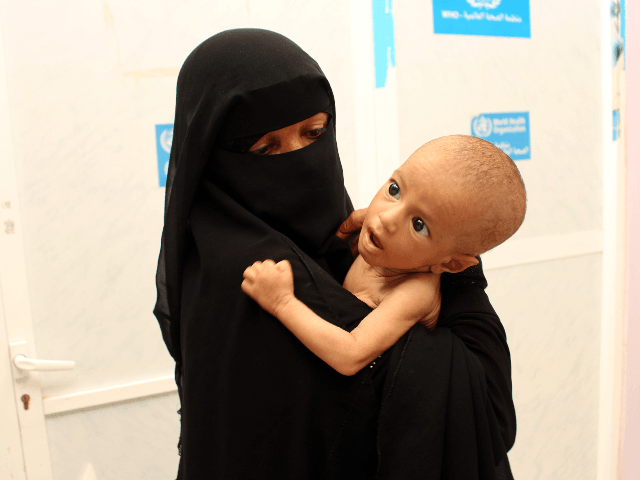Iran-backed Shiite Houthi rebels in Yemen have blocked an estimated 8,000-ton food shipment slated to feed about 100,000 families in the war-torn nation where millions are teetering on the brink of starvation, the World Food Program (WFP) revealed this week.
A spokesperson for WFP, a component of the United Nations, declared on condition of anonymity that “the aid was blocked after the WFP partially suspended aid last week after accusing the Houthis of looting,” the Associated Press (AP) reported on Tuesday.
Claiming it “was “contaminated with dead insects,” the Shiite Houthis prevented more than 8,000 tons of flour sent by the WFP from entering Yemen through the Red Sea port of Hodeida, the news outlet added.
“A subsequent check on the cargo, now docked in Oman, showed it was clean,” AP found.
Hodeida, considered the lifeline of the country as the primary gateway for desperately needed humanitarian aid to save millions of Yemenis from starvation, has been at the epicenter of clashes between Iran-allied Houthis and the internationally-recognized government, backed by a U.S.-assisted coalition led by Sunni Saudi Arabia and the United Arab Emirates (UAE).
The Houthis, who control territory in and around the Yemeni capital of Sanaa including Hodeida, also rely on the port for revenue and the entry of support from Iran. Houthi leaders deny receiving aid from the Islamic Republic.
Citing interviews with aid groups and government officials as well as public and confidential documents in December 2018, AP declared that “factions and militias on all sides of the conflict have blocked food aid from going to groups suspected of disloyalty, diverted it to front-line combat units or sold it for profit on the black market.”
Saudi Arabia and Iran are regional foes, making the Yemen conflict a proxy war between the two rivals. Yemen, which shares a border with Saudi Arabia, heavily relies on imports for the vast majority of its supplies and aid.
Marking the fourth anniversary of the Yemen conflict that has pitted the Shiite militiamen against the Sunni Saudi and UAE-led coalition, the U.N. reported on March 26 that 20 million Yemenis (about 70 percent of the population) are “food insecure,” including 10 million who find themselves “one step away from famine.”
At the time, the WFP called for “unhindered access to the vulnerable populations … to prevent the food security situation from further deterioration.”
Last week, the Armed Conflict Location and Event Data Project (ACLED) revealed that the Yemeni war had killed an estimated 91,600 people, noting that 2018 “is the war’s deadliest and most violent year on record.”
Last month, the Senate failed to rescind President Donald Trump’s veto of legislation that would have ended American military assistance for the Saudi-led war against the Iran-backed Houthi rebels.
U.S.-Iran tensions have intensified in recent days, raising the likelihood of a military confrontation between the two nemeses.
U.S. Secretary of State Mike Pompeo traveled to the Middle East this week, making stops in Saudi Arabia and the UAE, to build a “global coalition” against Iran, he told reporters on Sunday.
In recent days, Houthis have launched attacks against targets inside Saudi Arabia. Some local news outlets claim the Houthis already control territory within the Saudi borders.

COMMENTS
Please let us know if you're having issues with commenting.